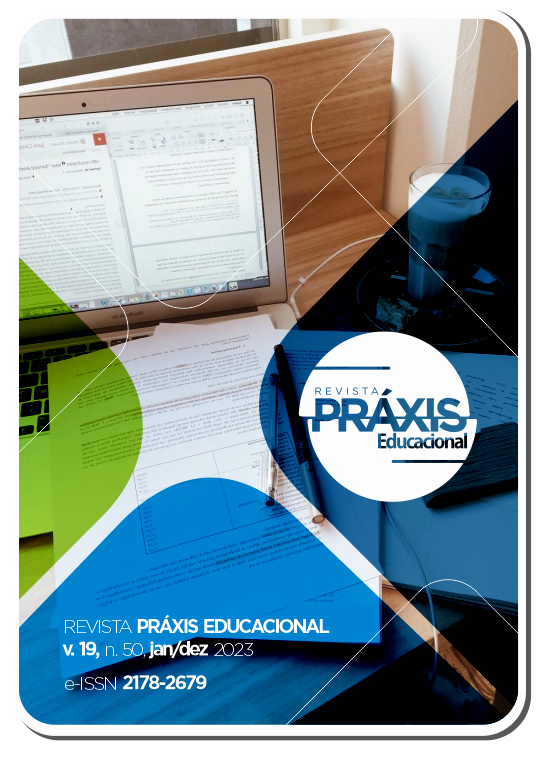Formative col@b and its potentialities in teacher education with digital cultures
DOI:
https://doi.org/10.22481/praxisedu.v19i50.13084Keywords:
Col@b formacional, collaboration, digital cultures, teacher education, interactivityAbstract
This article discusses the potential of Col@b Formacional with digital cultures in teacher education, a device (co)created in interactivity and collaboration between basic education teachers. This device is part of a doctoral research based, methodologically, on research-formation, in which researcher and subjects participate involved with their spaces-times. Conducted in a municipal public school, 16 Portuguese language teachers were involved, with itinerancy app-diaries and mediated conversations as data production devices. The analysis of the findings followed the perspective of subsuming notions. The results reveal that a) teacher education in act promotes processes of change and immersion with its own demands; and b) the reflective processes in the weaving of making-knowledge reverberate in (co)creation and teacher authorship, both contributing to the appropriation of plural and non-linear teaching practices with digital technologies.
Downloads
Metrics
References
BACHELARD, Gaston. A formação do espírito científico. 7. ed. Rio de janeiro: Contraponto, 1996.
BAKHTIN, Mikhail Mikhailovich. Para uma filosofia do ato responsável. 2. ed. São Carlos: Pedro & João, 2010.
ALVES, Nilda. Sobre os movimentos das pesquisas nos/dos/com os cotidianos. In: GARCIA, Alexandra; OLIVEIRA, Inês Barbosa de (org.). Nilda Alves: praticantepensante de cotidianos. Belo Horizonte: Autêntica, 2015, p. 39-48.
BARBIER, René. A pesquisa-ação. Brasília: Líber Livro, 2007.
CERTEAU, Michel de. A invenção do cotidiano: 1. Artes de fazer. 9. ed. Tradução: Ephraim Ferreira Alves. Petrópolis: Vozes, 2003.
FREIRE, Paulo. Pedagogia do Oprimido. 17 ed. São Paulo: Paz e Terra, 1987.
FREIRE, Paulo. Pedagogia da autonomia: saberes necessários à prática educativa. 4. ed. São Paulo: Paz e Terra, 2001.
FREIRE, Paulo. Pedagogia da esperança: um reencontro com a pedagogia do oprimido. 8. ed. Rio de Janeiro: Paz e Terra, 2013.
GALEFFI, Dante Augusto. Prefácio. In: MACEDO, Roberto Sidnei. A pesquisa e o acontecimento: compreender situações, experiências e saberes acontecimentais. Salvador: Edufba, 2014. p. 13-19.
GAUTHIER, Clermont; MARTINEAU, Stéphane; DESBIENS, Jean-François; MALO, Annie; DENIS, Simard. Por uma teoria da pedagogia: pesquisas contemporâneas sobre o saber docente. 3. ed. Ijuí: Editora Unijuí, 2013.
GRICE, Herbert Paul. Lógica e conversação. In: DASCAL, Marcelo (org.). Fundamentos metodológicos da linguística, vol. IV. Tradução João Wanderlei Geraldi. Campinas: IEL/UNICAMP, 1982. p. 81-104.
HILGERT, José Gaston. A colaboração do ouvinte na conversação do enunciado do falante – um caso de interação intraturno. In: PRETI, D. (org.). Interação na fala e na escrita. São Paulo: Humanitas, 2002. p. 89-124.
JOSSO, Marie-Christine. Experiências de vida e formação. Lisboa: Educa, 2002.
KINCHELOE, Joe L. Redefinindo e Interpretando o Objeto de Estudo. In: KINCHELOE, J. L.; BERRY, Kathlenn S. Pesquisa em Educação: conceituando a bricolagem. Tradução de Roberto Cataldo Costa. Porto Alegre: Artmed, 2007. p. 101-122.
LÉVY, Pierre. Cibercultura. Tradução. COSTA, C. I. da. São Paulo: 34, 1999.
LUCENA, Simone. Culturas digitais e tecnologias móveis na educação. Educar em Revista, Curitiba, n. 59, p. 277-290, 2016. Disponível em: https://www.scielo.br/pdf/er/n59/1984-0411-er-59-00277.pdf. Acesso em: 20 de jan. 2023.
MACEDO, Roberto Sidnei. Etnopesquisa Crítica, Etnopesquisa-Formação. Brasília: Liber Livro, 2006.
MACEDO, Roberto Sidnei. A pesquisa e o acontecimento: compreender situações, experiências e saberes acontecimentais. Salvador: Edufba, 2016.
MARCUSCHI, Luiz Antônio. A análise da conversação. 5. ed. São Paulo: Ática, 2003.
PRETTO, Nelson De Luca. Educações, Culturas e Hackers: escritos e reflexões. Salvador: Edufba, 2017.
PINTO, Carmen Lúcia Lascano; LEITE, Carlinda. Trabalho Colaborativo: um conceito polissêmico. Conjectura: Filos. Educ., Caxias do Sul, v. 19, n. 3, p. 143-170, set./dez, 2014.
NÓVOA, Antônio. Firmar a posição como Professor, afirmar a profissão Docente. Cadernos de Pesquisa, v.47, n.166, p.1106-1133, out./dez. 2017. Disponível em: https://www.scielo.br/pdf/cp/v47n166/1980-5314-cp-47-166-1106.pdf. Acesso em: 01 jan. 2023.
SALLES, Cecília Almeida. Redes da Criação: construção da obra de arte. 2.ed. São Paulo: Horizonte, 2008.
SANTAELLA, Lúcia. Culturas e Artes do Pós-Humano: da cultura das mídias à cibercultura. 2. ed. São Paulo: Paulus, 2003.
SANTOS, Sandra Virgínia Correia de Andrade Santos, SILVA; Camila Gomes Santos da; CARVALHO, Tainah dos Santos. Culturas digitais: diálogos e reflexões para a formação docente. Revista Tempos e Espaços em Educação, 15(34), e17744, 2022. Disponível em: https://seer.ufs.br/index.php/revtee/article/view/17744. Acesso em: 01 jul. 2023.
SANTOS, Sandra Virgínia Correia de Andrade Santos. Col@b formacional com as culturas digitais: tecendo redes docentes interativas e colaborativas. 2021. 278f. Tese (Doutorado em Educação) - Universidade Federal de Sergipe, São Cristóvão, Sergipe. Disponível em: https://ri.ufs.br/handle/riufs/15462. Acesso em: 01 jun. 2023.
SILVA, Marcos. Sala de aula interativa: a educação presencial e a distância em sintonia com a era digital e com a cidadania. In: CONGRESSO BRASILEIRO DA COMUNICAÇÃO, 24., 2001, Campo Grande. Anais [...] Campo Grande: CBC, 2001.
SILVA, Marcos. Sala de aula interativa. Rio de Janeiro: Quartet, 2014.
Downloads
Published
How to Cite
Issue
Section
License
Copyright (c) 2023 Práxis Educacional

This work is licensed under a Creative Commons Attribution-ShareAlike 4.0 International License.
You are free to:
Share - copy and redistribute the material in any medium or format; Adapt - remix, transform, and build from the material for any purpose, even commercially. This license is acceptable for Free Cultural Works. The licensor cannot revoke these freedoms as long as you follow the terms of the license.
Under the following terms:
Attribution - You must appropriately give credit, provide a link to the license, and indicate if any changes have been made. You may do so in any reasonable way, but not in a way that suggests that you or your use is endorsed by the licensor.
There are no additional restrictions - You cannot apply legal terms or technological measures that legally restrict others to make any use permitted by the license.










